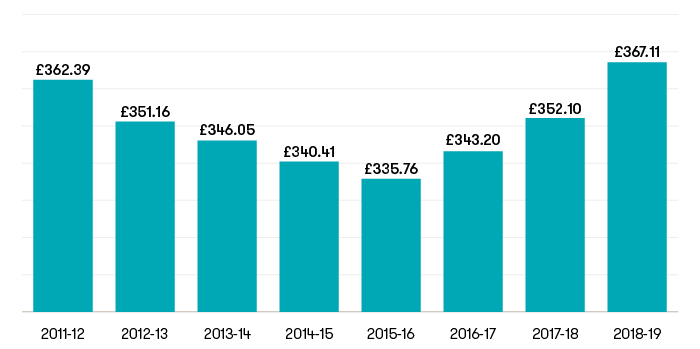The challenges traditionally facing the social care sector have been well documented in the media over the past year or so. But the recent COVID-19 outbreak is creating new challenges of unprecedented scale and impact.
In 2018/19, 47% of councils in England overspent on their adult social care budget, a 7% increase compared with 2017/18. It is now highly likely that, as they continue to do whatever is necessary to support their communities during this time, virtually every council in England will overspend on their budgets this year – budgets that were set just a month or so ago.
In the past, adult social care unit costs have been driven down significantly as a result of austerity. At a national level, 2015/16 marked the fourth successive year of unit cost reductions within adult social care, dropping from £362.39 to £335.76 since 2011/12. However, 2016/17 proved to be a turning point with the introduction of the social care precept, with unit costs increasing in every subsequent year.
Adult social care unit costs* per year 2011/12-2018/19

* Unit costs have been calculated based on the latest population estimates and the annual net service expenditure as reported by local authorities in their annual RO - source: Ministry of Housing, Communities and Local Government, Office for National Statistics
We are now anticipating a significant spike in unit costs this year. How big that spike will be is simply guesswork at this point as it depends on a number of factors, such as – the number of cases and fatalities from COVID-19, the duration of the current lockdown and any potential future outbreaks once the lockdown rules are relaxed.
Normally, it would be helpful for councils to look at comparative spend to discover how other regions and authorities are managing ever tighter budgets. Factors such as workforce availability, rurality, demographics and concentrations of provision by the market have all traditionally had a bearing on how much councils have to spend per head. But the coronavirus has ripped up the rule book.
The £1.6bn of funding announced by the Government to help councils respond to COVID-19 pressures is critical, along with the statement from the chancellor that the Government will do whatever it takes to support local government and the NHS through the crisis. Even on the most optimistic assumptions of when the outbreak will end, £1.6bn is unlikely to get close to the overall cost for local government. And these cost implications, for social care in particular, will endure well beyond the current outbreak.
Our councils and social care departments are having to make important decisions every day to try and manage the impact of COVID-19. These are tough decisions that won't always be perfect but need to be made and may have longer-term cost implications that won't be able to be mitigated or reduced overnight.
For example, the pressure to keep moving medically fit patients into social care is going to continue and so, pressure on residential and nursing care capacity is only going to go up.
Large numbers of people are now being transferred out of hospital and while ordinarily some would have ended up moving into this type of care environment, some may not. Some would have moved instead into a community setting through a promoting independence approach, which takes time and planning. Time that many councils currently don't have.
Placing people into residential or nursing care is a costly option and, once the crisis is abated, these placements might well need to remain. It will be difficult to move people back into the community once the outbreak has passed as needs will have escalated and expectations of care will have been set with the service users and their families.
There is no straightforward solution to this, but there are actions that councils can consider now, that could help in the longer term:
- Start to assess what the demand, cost and capacity implications could be – not just the immediate implications (as now being reported by councils to the Ministry of Housing, Communities and Local Government) but the longer-term, and less understood, cost implications well beyond the current outbreak.
- Forward planning (where possible) to try and mitigate some of these implications.
- Start to build a developing and evidence-based narrative around the longer-term implications of COVID-19 on social care demand, cost and capacity.
These measures may help focus minds so that, once the immediate pandemic is over, the effects will continue. And councils will need to both manage, but also be supported in meeting, that challenge.
Nick Clarke is head of social care consulting, public services advisory, at Grant Thornton UK LLP

